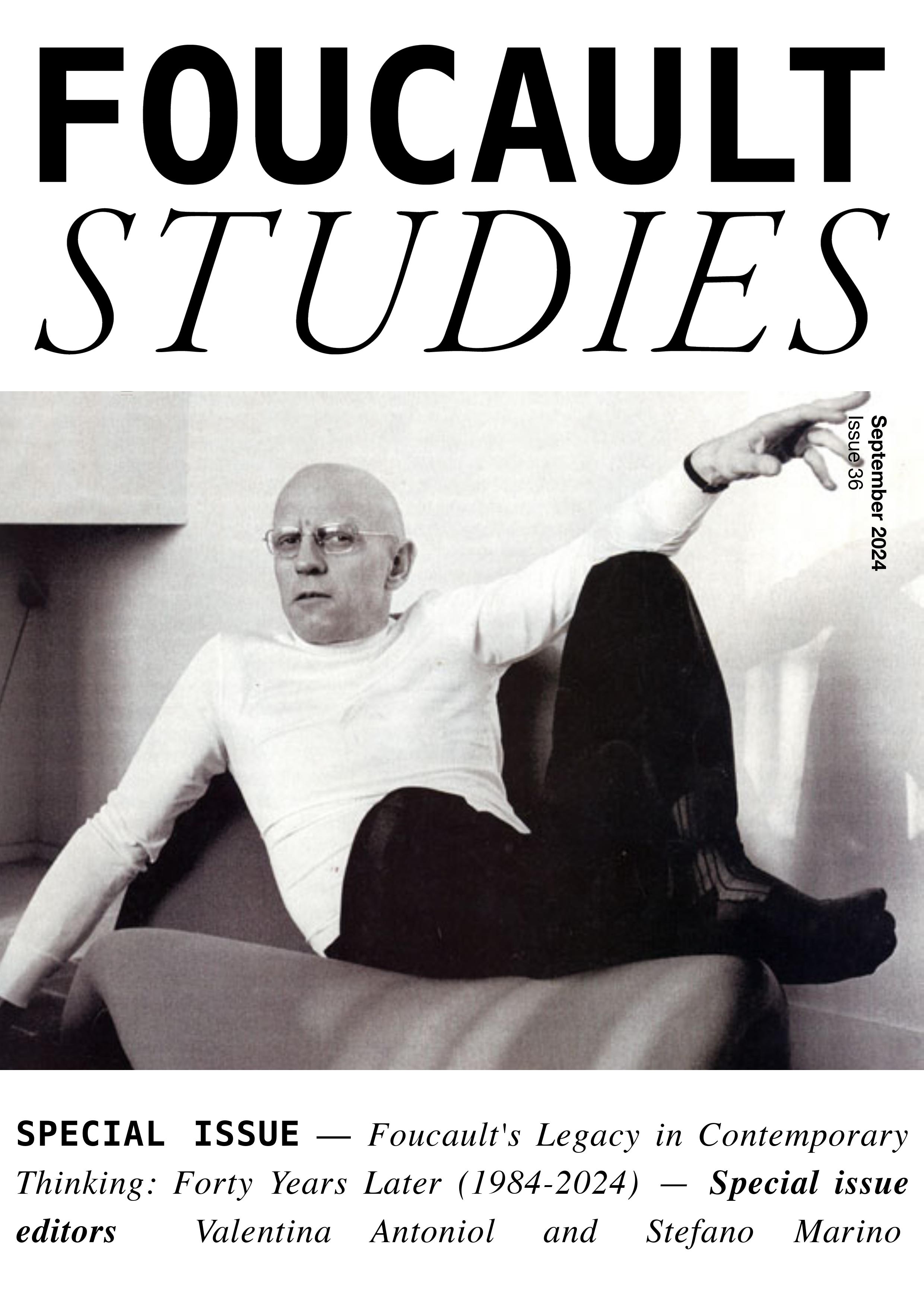The Actualité of Philosophy and its History: Michel Foucault’s Legacy on a Philosophy of the Present
DOI:
https://doi.org/10.22439/fs.i36.7234Keywords:
Actualité, Philosophy, Discourse, Diagnosis, ArchaeologyAbstract
From the late 1970s, and particularly in the last years of his life, Michel Foucault repeatedly returned to the status of philosophical reflection as an ontology of the present, of actualité, or an ontology of ourselves. However, the impact of these famous theoretical syntagms around a philosophy of the present or of actualité – one of Foucault's most precious legacies 40 years after his death – is not fully intelligible without considering that they were already at the heart of Foucault's reflections on the status of philosophy from the mid-1960s onwards.
Today, with the recent publication of the essay Le Discours philosophique, we can better understand how the concept of actualité shaped, within an archaeological framework of analysis, the highly complex elaboration of the status of philosophy as a discourse aimed at providing a diagnosis of our actualité. The theoretical density of this latter term reveals a rich panorama of philosophical references (sometimes explicit, sometimes more implicit) that are essential for grasping both the historical-conceptual stakes of this term and the way in which it is, for the first time, inscribed at the heart of the status of philosophy, giving rise also to the very possibility of making it an object of historicization that at the time was still only archaeological.
The aim of this contribution is to show how Le Discours philosophique broadens our understanding of what Foucault would later take up in a wider horizon of analysis, in which actualité would mark a renewed space of historical analysis of the contingent relationship between philosophy and its present, by redefining philosophical reflection as a practico-reflexive mode that Foucault will designate as “attitude” (and “critical attitude”).
References
Althusser, Louis, Écrits sur la psychanalyse. Freud et Lacan, ed. Olivier Corpet and François Matheron. Paris: Stock-IMEC, 1993.
Defert, Daniel, "Chronologie", in Dits et écrits, tome I, 1954-1975, ed. Daniel Defert and François Ewald. Paris: Gallimard, 2001.
Foucault, Michel, "Qu'est‐ce qu'un philosophe?" [1966], in Dits et écrits, tome I, 1954-1975, ed. Daniel Defert and François Ewald. Paris: Gallimard, 2001: 580-582.
Foucault, Michel, "Sur l'archéologie des sciences. Réponse au Cercle d'épistémologie" [1968], in Dits et écrits, tome I, 1954-1975, ed. Daniel Defert and François Ewald. Paris: Gallimard, 2001: 724-759.
Foucault, Michel, "Jean Hyppolite. 1907-1968" [1969], in Dits et écrits, tome I, 1954-1975, ed. Daniel Defert and François Ewald. Paris: Gallimard, 2001: 807-813.
Foucault, Michel, "La verité et les formes juridiques" [1974], in Dits et écrits, tome I, 1954-1975, ed. Daniel Defert and François Ewald. Paris: Gallimard, 2001: 1406-1514.
Foucault, Michel, in Dits et écrits, "Qu'est-ce que Les Lumières?" [1984] , in Dits et écrits, tome II, 1976-1985, ed. Daniel Defert and François Ewald. Paris: Gallimard, 2001: 1498-1507.
Foucault, Michel, The Order of Things. An Archaeology of the Human Sciences [1966]. New York, Pantheon Books, 1971.
Foucault, Michel, The Archaeology of Knowledge and the Discourse on Language, ed. A. M. Sheridan Smith. New York: Pantheon Books, 1972.
Foucault, Michel, Language, Counter-Memory and Practice: Selected Essays and Interviews, ed. D. F. Bouchard. Ithaca: Cornell University Press, 1977.
Foucault, Michel, Dits et écrits, tome I, 1954-1975, ed. Daniel Defert and François Ewald. Paris: Gallimard, 2001.
Foucault, Michel, Dits et écrits, tome II, 1976-1988, ed. Daniel Defert and François Ewald. Paris: Gallimard, 2001.
Foucault, Michel, "What is Enlightenment?" [1984], in The Foucault Reader, ed. Paul Rab-inow. New York: Pantheon Books, 1984.
Foucault, Michel, Psychiatric Power. Lectures at the Collège de France, 1973-1974, ed. Jacques Lagrange, trans. Graham Burchell. New York: Palgrave Macmillan, 2006.
Foucault, Michel, The Government of Self and Others. Lectures at the Collège de France, 1982-1983, ed. Frédéric Gros, trans. Graham Burchell. New York: Palgrave Macmillan, 2010. https://doi.org/10.1057/9780230274730
Foucault, Michel, Punitive Society. Lectures at the Collège de France, 1972-1973, ed. Bernard E. Harcourt, trans. Graham Burchell. New York: Palgrave Macmillan, 2015.
Foucault, Michel, La question anthropologique. Cours, 1954-1955, ed. Arianna Sforzini. Paris: Gallimard-Seuil-EHESS, 2022.
Foucault, Michel, Le Discours Philosophique, ed. Orazio Irrera and Daniele Lorenzini. Paris: Gallimard-Seuil-EHESS, 2023.
Foucault, Michel, Nietzsche. Cours, conferénces, travaux, ed. Bernard E. Harcourt. Paris: Gallimard, Seuil, EHESS, 2024.
Foucault, Michel, "La place de l'homme dans la pensée occidentale moderne" (The Place of Man in the Western Modern Thought), Bibliothèque nationale de France, NAF 28730, boîte 58, dossier 2.
Habermas, Jurgen, The Philosophical Discourse of Modernity: Twelve Lectures [1985], ed. Frederick G. Lawrence. Cambridge, UK: Polity Press, 1987.
Heidegger, Martin, What is Called Thinking? [1954], ed. J. Glenn Gray. New York: Harper & Row, 1968.
Downloads
Published
How to Cite
Issue
Section
License
Copyright (c) 2024 The Author(s)

This work is licensed under a Creative Commons Attribution-NonCommercial-NoDerivatives 4.0 International License.
Authors retain copyright to their work, but assign the right of the first publication to Foucault Studies. The work is subject to a CC BY-NC-ND 4.0 license, but despite these restrictions, authors can take for granted that Foucault Studies will permit articles published in Foucault Studies to be translated or reprinted in another format such as a book providing a full reference is made to Foucault Studies as the original place of publication.



